How To Use Resource Management Software To Plan Large Projects

Large projects can add another level of complexity to a project manager's workload and create the need for better strategies using resource planning software.
As a project manager, you have a lot on your plate. Not only do you need to manage the project's progress, but you also need to ensure all the necessary resources are being utilized efficiently. Large projects raise the stakes and demand fast, effective decisions inside a resource planning tool.
In this article, we'll discuss some of the best ways to manage your resources so that your large project can run as smoothly as possible, with help from modern resourcing software.
What is resource management planning?
Resource management planning is a critical element of organizational management and productivity. It involves strategically allocating resources - including people, money, equipment, materials, and technology - to achieve your business objectives. For a Professional Services business, resource planning typically refers to managing the capacity of your people. When done well, project resource management can make the difference between projects being delivered successfully and last minute scrambling to find people to execute on work that is already behind schedule.
There are a few key factors to consider when reviewing your resources:
Utilization targets
Utilization is defined as the amount of an employee's available time that's used for, billable work, expressed as a percentage. Targets are typically set at an individual level, with senior members having lower targets due to having more management or business development responsibilities. For example, a junior consultant may be set to 95% utlisation target, and a leader of a small firm may still carry a 50% target.
Targets vary by industry; set clear goals and track them in a resource management tool to guide productivity and reward success. Being able to track your utilisation against your target at a glance with resource management software allows consulting firms to stay one step ahead and appropriately assign resources going forward.
Daily, weekly, or monthly resourcing
What unit of time will you use to plan? Weekly is often the most popular, as it balances a hands-off approach with the ability to take action swiftly when needed.
The length of project plays a major role here. If your typical project lasts a few weeks, daily resourcing may make the most sense. if projects span years, weekly becomes cumbersome and a monthly view in resourcing software makes more sense. For example, you allocate 50% of a consultant’s time per month to a specific project for a period of 12 months.
Projected burn
In order to predict if your project will go over budget, project managers can calculate the projected burn using the formula “Worked + Resourced = Projected Burn”. Keeping plans realistic in resource planning software surfaces early warnings, so you can talk to clients or revisit fixed-price assumptions before overruns.
To streamline this process, resource planning software will automatically generate predictive projected burn reports using previous timesheet data and future planned resources.
Why is planning in a resource management tool important for large projects?
Resource planning is crucial for project managers, particularly on large projects. These strategies allow project managers to accurately measure the necessary resources needed for a successful project and make informed decisions about budgeting and resource allocations.
Here are a few ways that resource planning helps organizations run successful large projects.
Tracks available resources
Tracking availability and capacity allows you to pivot your resource allocation if an unforeseen event arises. Portfolio heatmaps in resource planning software show who can take work and where bench time is building, so Sales and Delivery stay aligned.
Constant monitoring of progress
Change logs and dashboards in a resource management tool make bottlenecks visible and actions auditable.
Optimizes costs
By working more efficiently and optimizing how your team spends their time, you can reduce the likelihood of excessive bench-time and even increase profit as a business.
Audit trail
Have you ever wondered how a specific resource ended up doing one project instead of another? Resource planning software shows who assigned the booking and when, creating a clear audit trail.
What problems can be avoided with resource planning software?
We’ve discussed the benefits of resource planning, but it’s also important to understand the issues you can avoid with accurate planning.
Clash of resources
A good resource planning strategy will lay out when and where your resources are being used, preventing double-bookings, delays and over-resourcing, which can cause employee burn-out.
Lack of accountability
Companies that struggle with Project Managers following a process to obtain resources for their projects can use resource management software to require PMs to allocate specific hours before confirming a booking.
Inadequate risk assessment
By consciously planning your resource requirements, you can factor in sicknesses, annual leave and unexpected delays. A good resource planning tool shows leave, holidays, and other conflicts so plans stay realistic.
Resource planning strategies for large projects
Project managers must formulate an efficient strategy when planning resources for large projects. Start with resource management software for professional services to plan, organize, and manage project resources. Here are the core planning stages for any large project:
Identify the resources needed
Shadow resourcing or placeholder planning can be used to identify all of the resources needed for a large project ahead of time. This includes a detailed plan for activities, timelines, and costs. Then, once you have shadow resourced your project, you can swap them out for the appropriate staff with the capacity to take on this work.
When it comes to large-scale projects, you need to consider the budget for salaries, equipment, materials, and other resources required to complete the project. Additionally, it is important to consider any external resources that may be needed, such as consultants or contractors.
Determine the priority of resources
When planning large projects, it’s essential to determine the priority list for resources. Collaborate with teams and use skills and role filters in resourcing software to identify who must be available first and any likely conflicts.
Pain points need to be identified early in the process so that changes can be made to the timeline before it becomes an issue. In addition, allocating resources in order of priority can help avoid any last-minute fires or delays that might otherwise occur.
Use previous projects as a reference
At any organization, previous projects can be beneficial as a source of information and reference when it comes to resource planning for larger projects. The past remains one of the best indicators of the challenges we may face. In resource management planning, use plan-vs-actual data by role and phase to recognize patterns and prevent repeat issues.
Use resource management software
Gone are the days of managing even the most basic of projects using complex and unwieldy spreadsheets. Such a rigid system cannot account for the multiple inputs, dependencies, and changes that occur regularly during a project's duration - making it difficult to track progress accurately. Resource planning software is a must for any large project.
Identify and estimate potential shortfalls
Being able to assess the existing capacity of your resources is a must for project managers of large projects.Use a dedicated resource management tool to filter by role, competency, and location, then run demand-vs-capacity to estimate shortfalls. Then, through capacity planning, any excesses or shortfalls can be identified and estimated.
Schedule appropriate resources for different project stages
The project manager's job is to determine the necessary personnel and resources needed for a successful project. This job involves identifying what type of skills, qualifications and experience is required, as well as ensuring the availability of resources at any given time.
Once decided, assign bookings to the right people in project resource management, balance workloads, and align stages with capacity.
Summary
With smart scheduling and a solid resource management software approach, large teams stay on track and do their best work more efficiently. If you're in need of resource management software that's built to support the unique needs of small and mid sized consultancies, book a Projectworks Demo today.
Related Articles

3 Project & Resource Management Upgrades MBB Made In Order To Grow Their Team By 300%
MBB Group is a high-growth independent advisory business, with a reputation for solving some of Australia’s toughest infrastructure challenges. As Australia’s infrastructure pipeline began to scale rapidly, so too did MBB’s team of energy, transport, water, mining, defence, logistics, and social infrastructure experts.

